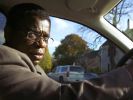Eye For Film >> Movies >> God Loves Uganda (2013) Film Review
By now, the violent rhetoric and extensive political opposition to LGBTI (lesbian, gay, bisexual, transgender and intersex) people in Uganda is widely known. What isn't as well known is how it arose. It's common to hear the argument that these are African values and concerned westerners should not interfere. In fact, there's little evidence of widespread prejudice in the region before European colonists arrived, and it has never been as extreme as it is today. As Ugandan LGBTI people fight for their rights (notably depicted in recent documentary Call Me Kuchu), this film takes a step back to ask where all that hatred came from.
The source isn't really in dispute - in fact, those responsible are proud of their actions. A group of American evangelical Christians, under the guidance of The Call creator Lou Engle, have been sending missionaries to Uganda for around 15 years, preaching a conservative version of their religion that demands traditional (western style) gender roles, the condemnation of LGBTI people and the 'rule of the righteous' - i.e. those who share their own beliefs. The phrase "I don't want a theocracy but..." is used here. To those familiar with the politics of the region, this is old news, but two things stand out in this film. The first is the level of access Williams has managed to get to these people. The second is his success in challenging the image of the Machiavellian manipulator. Though those figures are certainly present, the people we see most of are wide-eyed, happy-go-lucky teenagers embarking on what is to them the equivalent of an adventure vacation. They're bright, they're cheerful, they're easy to like, and one suspects that have no real understanding that they're getting people killed.

For the most part, the film concentrates on simple observation and on letting key figures expound their views. With the exception of Rebecca Kadaga, who may be more cautious now she's been tipped as a future president, most of the big names are here. We see David Bahati (author of the Kill the Gays bill) ranting and waving his fist in parliament, preacher Martin Ssempa using gay scat porn to push the line that all gay people want to prey on children, Scott Lively using flow charts to convince an audience that the gays control the UN are are plotting to destroy humanity. The implication is that these people are being allowed to damn themselves through the extremity of their arguments, though of course they may be perceived quite differently by different audiences.
Putting the other side, rather more calmly, is a clergyman who now lives in exile in America after speaking in defence of gay rights. There's also an interview with excommunicated Bishop Christopher Senyonjo, who bravely continues to speak out from within the country; and, heartbreakingly, with activist David Kato. Alongside this are clips of beatings taking place and of men raising their hands to show they would be prepared to kill LGBTI people. Through old posters and news clips, we glimpse the shadow of Idi Amin and the AIDS crisis, the past traumas of a nation where half the surviving population is under the age of 15, continuing to cast a long shadow.
Simply but effectively presented, this is a haunting documentary focusing on the power grab behind the human tragedy.
Reviewed on: 10 Oct 2013
















